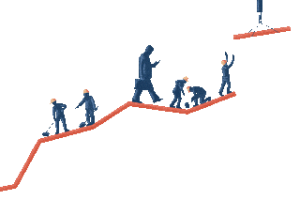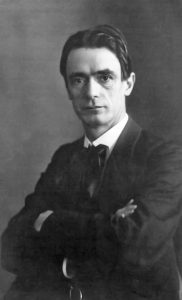The era of neo-liberalism is drawing to a close. What will replace it?
by
Rutger Bregman, Rob Wijnberg and Robert Gorter, MD, PhD.
Some people believe that you shouldn’t be doing politics now. Before you know it you are right in your own right. Then you are like the strict believer who calls this a punishment from God, as the populist who warns against the ‘Chinese virus’, or as the trend watcher who believes that we are finally entering a new era of charity, mindfulness, and free money for everybody.
Some people say that you should speak right now. Decisions are being taken at the moment, the consequences of which we will experience for years to come. Or as Obama’s chief of staff said after the fall of Lehman Brothers in 2008: “You never want a serious crisis to go to waste.”
In the first weeks, I felt more for the silence. I had written about the opportunities that crises offer, but now it felt inappropriate, almost indecent. But then the days began to pass. Little by little, the realization came that this crisis could last for months, a year, or more. And that temporary crisis measures can become permanent just like that.
Nobody knows what will happen this time. But precisely because we don’t know, precisely because the future is so uncertain, I think we should talk about it.
The spirit of the times is wobbling
On April 4, 2020, the British newspaper Financial Times published an editorial that is likely to be quoted by historians.
The Financial Times is one of the largest business newspapers in the world and, let’s face it, by no means a left-leaning newspaper. It is read by the richest and most powerful players in the political and financial world. Every month, the newspaper publishes an appendix under the obscure title “How to Spend It,” about yachts and villas, watches and sports cars.
In that newspaper we read on a memorable Saturday morning in April:
“Radical reforms – which reverse the prevailing policy direction of the past four decades – will have to come to the table. Governments will have to accept a more active role in the economy. They should view public services as investments rather than cost items and look for ways to make labor markets less uncertain. Redistribution will be back on the agenda; the privileges of the elderly and the wealthy in particular. Policies that until recently have been considered eccentric, such as basic income and capital taxes, will need to be included in the mix. ”

What had happened here? How could capitalism’s magazine suddenly plead for more redistribution, stronger government, and even basic income?
For decades, the institute had stood firm for a capitalist model – small government, low taxes, austere social security – the sharpest edges of which had been shaved off at the most. “In all the years I’ve worked here,” wrote a journalist who worked for the newspaper since 1986,
The ideas in that editorial did not come out of the blue. They had come a long way from the margins to the mainstream. They went from anarchist tent camps to primetime talk shows and from obscure blogs to the monumental Bracken House, which is home to the Financial Times.

Below: Friedman, on top: Hayek. Bron: Wikimedia
And now, amid the biggest crisis since World War II, they could change the world.
To understand how it got to this, we have to go a long way back in history. It may be hard to imagine, but there was a time – seventy years ago – when the defenders of free-market capitalism were the radicals.
In 1947 a small think tank was founded in the Swiss village of Mont Pèlerin: the Mont Pèlerin Society. The members were self-proclaimed “neoliberals,” such as the philosopher Friedrich Hayek and the economist Milton Friedman.
At the time, just after World War II, most politicians and economists were followers of British economist John Maynard Keynes, who advocated a strong state, heavy taxes, and a strong social safety net. The neoliberals, on the other hand, feared that the growth of the state would lead to a new tyranny. And so they resisted.
The members of the Mont Pèlerin Society knew they had a long way to go. “It usually takes a generation or longer …” Hayek wrote, “which is why (…) our ideas seem so powerless to influence the world today.”
Friedman agreed, “The people who rule the country now reflect the intellectual atmosphere of about two decades ago when they were in college.” The American economist believed that most people form their worldview around the age of 20. The result: “The old theories still dominate what happens in the political world.”
Friedman was an evangelist of market thinking. He believed that you should always start from self-interest. Whatever the problem, his solution was simple: get rid of the government, long live business. Or rather, the government had to make a market of everything, from care to education, if necessary under duress. Even after a natural disaster, competing companies should organize aid.
Friedman knew he was a radical. He knew he was well outside the mainstream, but he was drawing energy from that. In 1969 he was described by Time magazine as “a Parisian designer whose haute couture is bought by a select group, but influences almost all popular fashion.”
Crises played a central role in Friedman’s thinking. In the preface to his book Capitalism and Freedom (1982 edition) he famously wrote:
“Only a crisis – actual or perceived – leads to real change. When that crisis occurs, the actions taken will depend on the ideas that are out there. ”
The ideas are lying around. During a crisis, everything depends, the American economist believed, on the preliminary work that has been done. Ideas that were first portrayed as unrealistic and unfeasible may become inevitable.
And so it happened. During the crises of the 1970s (economic contraction, inflation, and an oil boycott of Arab countries), the neoliberals were ready in the wings. “Together they brought about a global change in policy,” concludes historian Angus Burgin. Hayek and Friedman’s once-radical ideas were picked up by conservative politicians like Ronald Reagan and Margaret Thatcher, and later even their political opponents Bill Clinton and Tony Blair.

US President Ronald Reagan in Los Angeles, November 1980. Reagan consults with his economic advisers on his new economic policy. From left to right: Walter Wriston, Milton Friedman, Daryl Trent, George Shultz, Ronald Reagan, Paul McCracken. Photo: Bettmann / Getty
Worldwide, one state-owned company after another was privatized. Unions were curtailed and benefits cut. Republican Reagan spoke of the “nine most terrifying words in the English language”:
View Reagan’s historical slogan here. “I am from the government and I am here to help.” After the fall of communism in 1989, even Social Democrats seemed to lose faith in the state. “The era of big government is over,” said Bill Clinton in his 1996 State of the Union speech.
Neo-liberalism had jumped from the think tanks to the journalists, and from the journalists to the politicians. It turned out to be as contagious as a virus. At a dinner in 2002, Margaret Thatcher was asked what she considered her greatest victory. Her answer? Tony Blair and New Labor. We forced our opponents to change their minds. ”
This anecdote was told in 2008 on the CentreRight blog. what she considered her greatest victory. Her answer? Tony Blair and New Labor. We forced our opponents to change their minds. ”
And then came 2008.
On September 15 of that year, the American bank Lehman Brothers fell and the biggest financial crisis since the Great Depression began. When the so-called “free” market had to be saved with gigantic subsidies from “Father State” (taxpayer), it seemed that neoliberalism was bankrupt.
However, 2008 was not a historic turning point. Left-wing politicians lost elections in one country after another. Cuts in education, healthcare, and social security were cut sharply as inequality continued to grow and Wall Street bonuses reached new record highs. A year after the crash, the Financial Times presented the online version of the luxury magazine “How to Spend It.”
Where the neoliberals had prepared for decades for the crises of the 1970s, their opponents were now empty-handed. They mainly knew what they were against. Against the cuts. Against the establishment. But your program? That was far from clear enough.

And now, twelve years later, the next crisis is emerging. More violent, shocking, deadlier. The United Kingdom is on the eve of the worst recession since the winter of 1709, according to the British Central Bank.
The Financial Times predicts the UK central bank’s biggest loss very soon. In the US, nearly 17 million Americans claimed benefits in three weeks. By comparison, during the 2008 financial crisis, it took two years to reach half that number.
In contrast to the crash of that time, the corona crisis has a clear cause. Back then, most of us had no idea what collateralized debt obligations and credit default swaps were, while everyone now knows what a virus is. After 2008, the reckless bankers’ debtors were often blamed, a trick that is now difficult to repeat.
But the main difference from 2008? The intellectual preliminary matter: “The ideas that are lying around.” If Milton Friedman was right and the unthinkable becomes inevitable in a crisis, history could take a very different turn now.
Three dangerous French economists
“Three Far-Left Economists Are Influencing The Way Young People View The Economy And Capitalism,” headlined an extreme right-wing website in October 2019.
I remember seeing the name of one of them for the first time: Thomas Piketty. It was the fall of 2013 and I was browsing the blog of Branko Milanović, an economist that I liked to read because he could be so damning about colleagues. But now Milanović suddenly took on a different tone. He had read a fat 970-page pill in French and was lyrical. “We are here in the presence of a watershed in economic thinking,” I read.
For many years, Milanović was one of the few economists to investigate inequality at all. Most of his colleagues should have had little of it. Nobel laureate Robert Lucas noted in 2004 that research into inequality is one of the “most toxic” threats to “sound economic research”.
Piketty had already started his pioneering work. In an obscure book from 2001, he first showed a graph with the income share of the richest 1 percent. Together with his colleague Emmanuel Saez, the second of that French trio, he demonstrated that the inequality in the United States is as great as during the roaring twenties. This academic work formed the basis for what would later become Occupy Wall Street’s slogan: “We are the 99 percent.”
In 2014 Piketty became world-famous. A real rockstar economist, and to the frustration of many (the Financial Times was still attacking at the time). Meanwhile, the professor traveled the world to share his recipe with journalists and politicians. The main ingredient? Taxes.
That was the specialty of the third of the French triumvirate, the young economist Gabriel Zucman. The day Lehman Brothers fell, he, a 21-year-old economics student, had his first internship day with a French stockbroker. In the following months, Zucman watched closely as the global financial system collapsed. What struck him then: the gigantic amounts that flowed through small countries such as Luxembourg and Bermuda – the tax havens where the wealthy of the earth hide their money.
In just a few years, Zucman became one of the largest tax experts in the world. In his book The Hidden Wealth of Nations (2015), he calculated that the wealthiest have hidden as much as $ 7.6 trillion in tax havens. In a book he co-authored with Emmanuel Saez, Zucman calculated that the four hundred wealthiest in the U.S. pay percent less tax than all other income groups, from plumbers to cleaners, from nurses to retirees.
“High taxes don’t have to be harmful to the economy; they can even make capitalism work better”
The young economist needs few words to make his point. Where his mentor Piketty published another big pill in 2020 (1,088 pages this time), you have the book by Zucman and Saez in a day. The subtitle: “How the Rich Dodge Taxes and How to Make Them Pay. It reads like a to-do list for the next American president. ”
The most important step: introduce an annual, progressive tax on wealth for all multi-millionaires. High taxes do not have to be harmful to the economy. On the contrary, they can make capitalism function better. (In 1952, the highest income tax rate in the U.S. rose to 92 percent, while the economy grew faster than ever.)
Five years ago, these kinds of ideas were considered far too radical. President Obama’s economic advisers thought that a wealth tax would not work and that the wealthy would hide their money anyway (with their armies of accountants and lawyers). Even the team of former left-wing presidential candidate Bernie Sanders turned down the French trio’s advances in 2016 when they proposed designing a wealth tax.
But 2016 has been an ideological eternity. “Moderate” presidential candidate Joe Biden now has a tax plan twice as robust as Hillary Clinton’s four years ago. Meanwhile, the majority of Americans (including Republican voters) are in favor of much higher taxes for the very wealthiest. On the other side of the ocean, even the Financial Times concluded that a wealth tax might be a good idea after all.
Beyond salon socialism
“The problem with socialism,” Margaret Thatcher once said, “is that other people’s money has run out at some point.”
Thatcher put the finger on the sore spot. Traditionally left-wing politicians like to talk about inequality and taxes. But where should all that money come from? The dominant assumption, also to the left, is that most prosperity is “earned” at the top by visionary entrepreneurs like Jeff Bezos and Elon Musk. Then a moral appeal is made: shouldn’t those great men of the world share any of their wealth?
If you feel the same way, then it’s time to meet Mariana Mazzucato, one of the most progressive economists of our time. Mazzucato is part of a generation of mostly female economists who don’t think it is enough just to talk about taxes. “The reason progressives often lose the discussion,” Mazzucato notes, “is that they focus too much on wealth redistribution and too little on wealth creation.”
In recent weeks, lists of the so-called “vital professions” have been published all over the world. And surprise: positions such as “hedge fund manager” and “tax specialist for multinationals” were not included. Suddenly it was crystal clear who is doing the really important work in healthcare and education, public transport and supermarkets.
As early as 2018, a study by two Dutch economists showed that about a quarter of the working population doubts the usefulness of their job. And completely fascinating: there are four times as many “socially useless jobs” in business as in the public sector. Especially in the financial sector and marketing, people often see their work useless. (Interesting detail: economists are also overrepresented in the “useless” class.)
This raises the question: where does wealth come from? Media such as the Financial Times, like their neoliberal spirit fathers Friedman and Hayek, have always claimed that prosperity comes from entrepreneurs, not the state. The government would have a facilitating role at the most. She has to ensure good infrastructure and nice tax credits – and then get her out.
But in 2011, when Mazzucato had heard a politician scoff at officials like “enemies of enterprise” for the umpteenth time, something clicked in her head. She went to investigate. Two years later, there was a book that hit bomb makers all over the world. Title: The Entrepreneurial State.
Virtually every substantial innovation starts with the government
Mazzucato shows that not only education and care, garbage collection, and mail delivery, but also substantial innovation almost always starts with the government.
“Meet the greatest investor of all time.” Take the iPhone. Every piece of technology that turns the iPhone into a smartphone instead of a stupid phone (Internet, GPS, touchscreen, battery, hard drive, voice recognition system) has been developed by researchers whose salaries have been paid by the government.
And what applies to Apple, also applies to other technology giants. Google? Received a big grant to develop the search engine. Tesla? Hardly found investors until the U.S. Department of Energy stepped in with $ 465 million. (Elon Musk is an early-stage grant guzzler anyway. Three of his companies – Tesla, SpaceX, and SolarCity – have received nearly $ 5 billion in taxpayers’ money.)
“The further I looked,” Mazzucato told technology magazine Wired last year, “the more I realized: the state’s investments are everywhere.”
Of course, the government sometimes invests in projects that fail, but that is not surprising – that is the intention. If you want to do business, you have to take risks. And the problem with most private “venture capitalists,” Mazzucato explains, is that they don’t dare to do so much. For example, after the outbreak of SARS in 2003, private research on coronaviruses was quickly halted; it wouldn’t be profitable enough. The public investigation did continue, the US government alone invested no less than $ 700 million. (If that vaccine comes later, thank the government.)
The pharmaceutical industry is perhaps the best example of Mazzucato’s statement. Medical breakthroughs almost always come from publicly funded laboratories. Large pharmaceutical companies such as Roche, Merck, and Pfizer are particularly busy buying up patents and selling old medicines in new PR jackets. They use the profit to pay out dividends and to buy back shares (which boosts stock prices). Since 2000, the annual payments to the shareholders of the 27 largest pharmaceutical companies have quadrupled.

This can and must be done differently, says Mazzucato. If the government has funded a major innovation, the business community may well run off with it. That is the intention. But then the state would have to get its investment back, with interest. It is therefore maddening that the largest subsidy guzzlers are also the largest tax evaders. Companies like Apple, Google and Pfizer have hidden tens of billions in tax havens around the world.
It goes without saying that these companies should pay their fair share of taxes. But Mazzucato finds it even more important that the state shows what he can do himself. She likes to refer to the Space Race of the 1960s. “We chose to go to the moon this decade,” President Kennedy said in 1962, “Not because it’s easy, but because it’s hard.”
Even now there are enormous challenges where an entrepreneurial state can unleash its unparalleled innovative strength. What about one of the most pressing problems we have ever known as humanity: climate change.
Read here: “Climate change is the big story of our time when everything should dominate”. More than ever, the transformation the climate crisis demands of us requires the mindset that Kennedy sang in his speech. It is not without reason that Mazzucato, together with British-Venezuelan economist Carlota Perez, is the intellectual mother of the Green New Deal – the most ambitious plan in the world to tackle climate change.
Another friend of Mazzucato, American economist Stephanie Kelton, adds that if necessary, the government can print money to fund its ambitions. We don’t need to worry about the national debt or the budget deficit. (Economists such as Mazzucato and Kelton have little patience for old-fashioned politicians, economists and journalists, who start talking about the state’s “housekeeping book.”
Historian Adam Tooze wrote a clear piece in The Guardian about what to do with the mountain of debt of the corona crisis. As if households can levy taxes, or borrow money in their own currency.)

Mariana Mazzucato op het World Economic Forum in Davos in 2019. Foto: EPA / Hollandse Hoogte
All in all, we are talking here about a revolution in economic science. After the crisis of 2008, cutbacks were cut hard, but we now live in a time when someone like Kelton (author of the book with the significant title The myth of the budget deficit) is described by the Financial Times as a modern Milton Friedman. When the same newspaper wrote in April this year that the government should “view public services as investment rather than cost items,” that was exactly what Kelton and Mazzucato have argued for years.
Perhaps the most interesting thing about these women is that they don’t settle for words. They want results. For example, Kelton is an influential political advisor, Perez has worked as a consultant for numerous companies and institutions, and Mazzucato is also a networker pur sang, who knows her way through the institutions.
The Italian is a welcome guest at the World Economic Forum in Davos (where the world’s rich gather every year) and has advised both US Senator Elizabeth Warren and Congressman Alexandria Ocasio-Cortez and Scottish Prime Minister Nicola Sturgeon. Last year, the European Parliament voted for an ambitious innovation program – a plan written by Mazzucato.
“I wanted the work to have an impact,” the economist then commented dryly. “Otherwise, it is salon socialism: you chat and nothing happens.”
How ideas conquer the world
How do you change the world?
When it comes to that question, it never takes long in Left circles for the name of Joseph Overton to fall. Overton was a follower of Milton Friedman. He worked for a neoliberal think tank and spent years fighting for lower taxes and a smaller government. He wondered how – over time – the unthinkable became inevitable.
Imagine a window, said Overton, into which the ideas fall that are considered “acceptable” or even “popular” at one point. Politicians must remain within this window if they are to be re-elected. On the other hand, if you really want to change the world, you have to move that whole window. How? By pushing on the flanks. By being unreasonable, intolerable and unrealistic.
Overton’s window has undeniably shifted in recent years. What was once marginal is now mainstream. An obscure chart by a French economist became the slogan of Occupy Wall Street (“We are the 99 percent”), Occupy Wall Street laid the groundwork for a revolutionary presidential candidate, and Bernie Sanders pulled other politicians like Joe Biden back.
More American youth now believe in socialism than in capitalism, which was unthinkable thirty years ago. (In the early 1980s, neo-liberal Ronald Reagan enjoyed its greatest popularity among young people.)
But hasn’t Bernie Sanders lost the primaries? And didn’t that socialist Briton Jeremy Corbyn suffer dramatic election defeat last year? Indeed.
However, election results are not the only indication of the zeitgeist. Corbyn lost the 2017 and 2019 elections, but the Conservatives’ ultimate policy was closer to Labor’s financial plans than to its own manifesto. Sanders had a more radical climate plan than Joe Biden in 2020, but Biden’s climate plan is more radical than Sanders’s in 2016.
It was not without reason that Margaret Thatcher replied “New Labor and Tony Blair” when asked about her biggest victory: her party was defeated in 1997 by an opponent with her mind.
Changing the world is simply a thankless job. Don’t count on a triumphant moment when your opponents will humbly recognize you right. Plagiarism is the highest attainable in politics. Milton Friedman described this process as early as 1970, when a journalist asked how his ideas would conquer the world. It would go in four steps:
The first principle: The views of crazy people like me are avoided.
The second principle: The defenders of the status quo become uncomfortable because my ideas seem to contain an element of truth.
The third principle: People say, “We all know this is an … extreme view, but of course we need to look at more moderate ways to go in that direction.”
The fourth act: My opponents put my ideas away as unsustainable caricatures, so they can take the position where I was before.
But still. Being right and being right remain two different things.
Just because big ideas start with crazy people does not mean that all crazy people have big ideas. And that radical ideas sometimes gain in popularity does not mean that winning elections is sometimes fun.
Many of the self-proclaimed “radicals” have no or an ill-considered plan to gain power. Anyone who criticizes this is quickly dismissed as a traitor. The left often seeks the blame with the other – the press, the establishment, the doubters in its own circle. But rarely on its own.

I realized once again how difficult it is to change the world when I read the book Difficult Women by British journalist Helen Lewis during this lockdown. It is a history of feminism in Britain, but it should be read by any aspiring world improver.
By “difficult” Lewis means three things:
1) It is difficult to change the world. You have to make sacrifices and suffer pain.
2) Many revolutionaries are difficult. Progress often starts with tricky, insufferable types who go against the status quo.
3) World improvers are far from perfect. It is not the flawless heroes that they later become in the canon.
Lewis’s criticism is that many activists seem to deny this complexity, making it a lot less effective. Many twitterers seem to find it more important to measure other twitterers. The hero of yesterday can be removed again tomorrow, if a spot is still discovered, or if a wrong formulation has been used.
Lewis shows that there are different roles to play in every movement, and that uncomfortable alliances and compromises are often needed. For example, the British struggle for women’s suffrage brought together countless ‘difficult women’, from ‘fish women to aristocrats, from baker girls to Indian princesses’. That complex alliance lasted just long enough for the triumph of 1918: the right to vote for women over thirty with property.
(Indeed: at first only voting rights for privileged women. It turned out to be a sensible compromise, because after that first step the following became inevitable: general women’s suffrage in 1928.)
And no, despite this success, all those feminists did not become friends. On the contrary. Lewis writes, “Even for the suffragettes, the memory of their great triumph was soured by quarrels among themselves.” Progress is complicated.
Despite the success, the early feminists did not become friends. Progress is complicated
In our interpretation of activism, we often forget that all those different roles have to be played. In talk shows and at our own kitchen tables, we tend to choose a favorite kind of activism: we absolutely love Greta Thunberg, but the roadblockers of Extinction Rebellion are nothing at all. Or we may find the protesters on Occupy Wall Street admirable, but loathe the lobbyists who show up in Davos.
This is not how change works. All these people have a role to play. The professor and the anarchist. The networker and the agitator. Someone who writes in academic jargon, someone who translates for a wider audience. Someone who provokes, someone who brings people back together. Someone who lobbies behind the scenes, someone who gets dragged away by the ME.
And one thing is certain: at some point it will no longer be enough to push against the edges of the Overton Window. At some point, it’s time to march through the institutions – to bring the once-radical ideas to the center of power.
I suspect that time has now come.
The dominant ideology of the past forty years is dying. What will take its place? No one is sure. It is not difficult to imagine that this crisis can put us on an even darker path. That those in power will seize the opportunity to increase their power, curtail the freedoms of their populations and further ignite the fires of hatred and racism.
But it can (must) be different. Thanks to the hard work of countless activists and academics, networkers and rioters, another way is now conceivable. This pandemic could lead to new values.
If neo-liberalism had one dogma, it was that most people are egoists. Everything else followed from this cynical view of man – privatizations, growing inequality, the erosion of the public sector.
Now there is room for a different, more realistic view of man: that man has evolved to work together. Everything else can arise from that conviction: a trusting government, a solidarity tax system and sustainable investments that are necessary for our future. That way we can be ready just in time for the biggest test of this century, our pandemic in slow motion: climate change.
Nobody knows where this crisis will take us. But at least we are intellectually better prepared than last time.
Dr. Gorter: I want to pay attention to the truly mind-blowing and new ideas by the German-Austrian Renaissance man Rudolf Steiner PhD (1861-1925). He outlines the principles of Threefold-Social-Order.

Rudolf Steiner, PhD. (1861-1925)
Rudolf Steiner: The social function of money is nothing more than the externally expressed value that is generated by the division of labor and that is transferred from one to the other.” (Lit.: GA 340, p. 57).
“The function, the meaning that money has today has to be changed. In the future, money will be a kind of changing bookkeeping, a kind of writing down what you have produced and what you can exchange for it. All of this is not something which can only be striven for in decades, but can be striven for immediately if only enough people understand it. Everything else is basically Vishivashi.” ( Lit .: GA 331, p. 173 )
“One takes money. With money one economizes. With the money one frees oneself from the solidity of the productive process itself. In a way one abstracts the money in the economic process, how one abstracts the thoughts in the process of thought. But just as little as one realizes out of abstract thoughts If you can conjure up ideas and sensations, you can conjure up something real out of the money if you overlook the fact that money is only a sign for goods that are produced, that money is, to a certain extent, just a kind of bookkeeping, a fluent bookkeeping, that everyone Money signs must stand for some good. ” ( Ref : GA 332a, p.60 )
“So the point is that you really look at the principle that you think out of reality, not out of preconceived gray theories. You see, sometimes those who think well out of reality have individual phenomena A very healthy judgment. I explained to you today that monetary rule actually confuses the real social situation. You just have to see through it. It actually works in such a way that money causes power relationships, tyrannized relationships to replace old ones Conqueror powers and the like simply give power to money. In Europe you can hardly see through such things. There is an American proverb that says something like: becoming rich through mere capital management means after three generations go around in shirt sleeves again! – There the imagination of the capital economy is clearly presented, this dissolving, this imaginary. You can become a billionaire, and after three generations the offspring will of course walk around in shirt sleeves because the money of the rulers will be over people. “(Ref : GA 332a, p.67 )
Money is realized Spirit
“So we see capitalism appearing in the pursuit of the division of labor, we see the money economy appearing in the pursuit of capitalism, and very soon. Money is a complete abstraction from the special economic events. If you have five francs in your pocket, you can You buy a lunch and a supper for it, as you can buy a suit. For the money it is irrelevant what is purchased for what it is exchanged in the economic process they are still influenced by nature, absolutely indifferent, but this is why money becomes the expression, the tool, the means for the mind to intervene in the economic organism that is in the division of labor.
Without the money being created, it is not at all possible for the mind to intervene in the economic organism when we speak of the division of labor. So we can say that what is originally together in the economic state, what each individual develops in their egoism, is distributed to the whole. – That’s the way it is in the division of labor. In the capital, details are again combined to form an overall process. Capital formation is a synthesis, quite a synthesis. Thus, the one who has acted as a capitalist in this way, who can transform his capital into money capital through the necessity of the appearance of money, becomes a borrower for someone who has nothing but spirit. He receives the money. This is the right representative of economic values applied by the spirit.
We have to look at it economically. Religiously and ethically, money may be a bad thing; in the economic sense, money is the spirit that works within the economic organism. It is no different. So, in the economic process, money has to be created so that the mind in general can progress from the point of departure where it only turns to nature. It would remain in primitive states if it applied only to nature. In order to pour the achievement of the spiritual into the economic process again, it must be realized as money. Money is a realized mind. But the concrete comes right back in. First of all, money is an abstract that can be said to be the same, whether I buy a part of the suit for five francs or have my hair cut – it doesn’t have to be a single haircut – I mean, it doesn’t matter for the money. But when money comes back to the person of man and thus to the spirit of man, at that moment money becomes what is now economically active in its specific particular fact. That means: the mind is economically active in the money inside. “(which in turn is economically active in its specific particular fact. That means: the mind is economically active in the money inside. “(which in turn is economically active in its specific particular fact. That means: the mind is economically active in the money inside. “(Lit .: GA 340, p. 57ff )
Wear of money leads to aging of money
Just as the goods wear out over time, the money that is their value meter will also have to wear out in the healthy social organism:
“In a healthy social organism, money will really only be a value meter, because behind every piece of money or bank note is the goods that the money owner alone could have got the money for. Due to the nature of the circumstances, facilities will become necessary which deprive the money of its value to the owner if it has lost the meaning just described. Such facilities have already been referred to. After a certain period of time, ownership of the money is passed on to the general public in a suitable form. And thus money that does not work in production plants, If the owners do not withhold the measures of the business organization, they may be reshaped or reprinted from time to time. However, such circumstances will also result inthat the interest rate on a capital decreases over the years. Money will wear out like goods wear out. But such a measure to be taken by the state will be fair. There will be no “interest on interest”. Anyone who makes savings, however, has performed services which make him entitled to later goods in return, such as current services for the exchange of current returns; but the claims can only go up to a certain limit; because claims arising from the past can only be satisfied by contemporary work. Such claims must not become an economic means of violence. By realizing such conditions, the currency question is put on a sound basis. Because no matter how the form of money takes shape from other circumstances: Currency becomes the sensible institution of the entire economic organism through its administration. The currency question will never be satisfactorily resolved by law in a state; current states will only solve them if they do without the solution on their part and leave what is necessary to the economic organism to be separated from them. “(Lit .: GA 23, p. 132f )
In the Middle Ages there was “aging money” in the form of the Bracteate currencies until about 1413. The economy and culture of this period were therefore largely spared from currency crises.
The much-discussed Tobin tax and JM Keynes’ “carrying costs” approach could be the first steps towards aging money. Current inflation is not sufficient for this, since it is sometimes lower than the simultaneous economic growth. In economic trials, mostly according to Silvio Gesell, it was proven that “aging money” is fundamentally realizable. Currently, such approaches are only available in complementary currencies in concrete implementation. Some Swiss banks are also currently charging a negative interest rateon savings due to the strong currency appreciation of the Swiss franc. This solution fits the special Swiss circumstances, as Switzerland is considered a tax haven. The German government also issues short-term government bonds with 0% interest. Including the simultaneous inflation, this also results in a negative interest rate. A consequence of the negative interest rate is the resulting rising propensity to consume, which is suitable to stimulate the economy.
True monetary stability
The current world economy is dominated by its anonymous, faceless capital that is straying through all states. This is piling up to gigantic speculative bubbles. It is always and always looking for the fastest and at the same time the highest possible profit. This is also called casino capitalism. In the wholesome social organism, however, the currency must represent an actual equivalent – it must not exist detached from the sphere of the circulation of goods. “And so we will find that, I would say, the flying accounts of the global economy, there will have to be something similar to wheat that can be produced on so and so many square meters of floor space, which is then compared with the other things . (…) You have thus reduced the currency to the usable means of production on which physical work is done – means of production of any economic area – and that is the only healthy currency: the sum of the usable means of production. ”(Lit .:GA 340 , pp. 209-210). Even the spirit applied to work, which constitutes capital, must not operate completely detached from the real quantity of goods. That is why exchange rings and complementary currencies are so popular with people, because they always keep the specific reference to the goods and services from which they originated.
The processes in the USA under the keyword “fiscal cliff” are currently threatening to pull the global economy down. True currency stability looks very different.
Ahriman-Mammonism-Selfishness
“The mammonism of money is Ahriman’s weapon of attack wherever man is weak – in the natural egoism of man. In the twentieth century the naked, namely the material power through the Trinity Ahriman-mammonism-egoism reached a climax (…)”. (Lit .: HG Schweppenhäuser: The Mystery of Money, p. 114)
And hopefully the crisis of the 21st century will give us a way out of the money dilemma.
The fetish character of money
Joachim Stiller often pointed out that money is fundamentally fetish. Goods are not fetish in character, as Marx mistakenly assumed and claimed, but money alone is in Fetish. It practically becomes an idol, a substitute god, who is rightly called the god Mammon.
You can’t live from money (alone)!
“… When it is said that people have to gain interest, the individual for the other, it must not only be viewed in the spirit as stated in the Sunday afternoon sermons, but it must be viewed as it is points deeply into the social structure of the present. Take a specific case. How many people are there today who have a very abstract, confused idea of life, of their own personal life!
For example, if you ask yourself: How do I live? – They mostly don’t do it, but if they did – then they say to themselves: Well, from my money. – Among those who say: From my money – there are many, for example they have inherited this money from their parents and now believe that they live from the money they have inherited from their fathers. But, my dear friends, you cannot live on money! Money is not something you can live on. You have to start thinking. And this question is closely related to the real interest that one has from person to person.
Whoever believes that the money he inherits or has received in some other way, except as is normally the case today, that people get money through work, which lives and believes that he gets the money can live, he has no interest in his fellow human beings, because nobody can live on money. People have to eat, and what is eaten has to be worked out by some people. Man has to dress. What he attracts people to do. So that I can put on a skirt or trousers, people have to spend hours working to get it done. They work for me. I live from it, not from my money.
My money has no value other than giving me the power to use the other’s work. And just as the social conditions are today, you only start to be interested in your fellow human beings if you answer this question in the appropriate way, if you see in your mind, so many people have to work so many hours for me to the social structure can live inside. It is not about doing yourself good by saying: I love people. – You don’t love people when you think you live on your money and don’t imagine in the least how people work for you so that you only have a minimum of life at all … “(Lit .: GA 186 , Lecture on Nov. 30, 1918).
The Principle of Threefold Social Order is the reflection of Threefold Man: Thinking-Feeling-Willing (Acting). With the principle of Freedom in the realm of Thinking (Culture) and Equality in the realm of Law & Justice and the agreements we make and Brotherhood in the realm of Economics: I donate my labor to you and I trust you do the same for me….. Thus; income according to one’s own needs.
Dr. Gorter: I had many initiatives like organic vegetarian restaurants with cooking classes where we followed this principle: every coworker had an income according to his (her) needs.
The same with several clinics for general medicine and a few clinics for non-toxic therapy for cancer patients (www.gorter-model.org)

Rob Wijnberg is a philosopher and publicist who, before co-founding De Correspondent, served as editor-in-chief of NRC Next, a spin-off from NRC Handelsblad, the Netherlands’ premier daily national newspaper. With his specific and outspoken views on the role of news in modern society, published in numerous columns and articles and several books, Rob has attracted a large and dedicated following. Rob serves as editor-in-chief of De Correspondent.

Rutger Bregman (* April 26, 1988) Dutch journalist and author and hold a master of arts in history (2010–2012) of Utrecht University and the University of California

Robert Gorter, MD, PhD. (* October 7, 1946) Professor University of California San Francisco Medical School (UCSF) and senior lecturer at San Francisco State University (SFSU), Epidemiologist and Public Health specialist, Philosophy University of Amsterdam, etc.
Sources:
Rudolf Steiner : The key points of the social question , GA 23 (1976) pdf pdf (2) html mobi epub archive.org rsarchive.org
Rudolf Steiner : The liberation of human beings as the basis for a new social structure. Old thinking and new social will. , GA 329 (1985) pdf pdf (2) html mobi epub archive.org rsarchive.org
Rudolf Steiner : Works Councils and Socialization , GA 331 (1989), ISBN 3-7274-3310-8 pdf pdf (2) html mobi epub archive.org rsarchive.org
Rudolf Steiner : Social Future , GA 332a (1977), ISBN 3-7274-3325-6 pdf pdf (2) html mobi epub archive.org rsarchive.org
Rudolf Steiner : National Economics Course , GA 340 (1979) pdf pdf (2) html mobi epub archive.org rsarchive.org
Rudolf Steiner : The basic social demands of our time – in a changed time , GA 186 (1990) pdf pdf (2) html mobi epub archive.org rsarchive.org
Hans-Georg Schweppenhäuser : The sick money. Proposals for tomorrow’s social monetary order , Fischer TB, Frankfurt aM 1982
Hans Georg Schweppenhäuser : The Organic Money Order , Institute for Social Contemporary Issues eV Berlin, Freiburg i.Br., 1975, PDF
The mystery of money. Humanities knowledge to understand an organic monetary order , Vlg. Die Kommenden, Freiburg i.Br. 1981, ISBN 3-7823-0172-2 Rez. In: Erziehungskunst 2/1983, pp. 114-115 (Stefan Leber) (review by Stefan Leber)
Dieter Suhr: Aging money. Rudolf Steiner’s concept from a monetary perspective , Novalis Vlg., Schaffhausen 1988
Dieter Suhr: Aging money. Rudolf Steiner’s concept from a monetary perspective , Novalis Vlg., Schaffhausen 1988
Dieter Suhr: Equal Freedom – General Reciprocity Deficits in the Money Sector , Augsburg: Lothar Mette Verlag, 1988, Reprint “Questions of Freedom” Issue 259/260, 2001, PDF
Stefan Leber et al .: nature and function of money. Buying, borrowing and giving in the economic process , Social Science Forum Volume 3, Vlg. Freies Geistesleben, Stuttgart 1989, ISBN 3772509045 , book review and table of contents by Peter Exner, 2004
More than money – shaping the economy , Flensburger Hefte No. 111, Flensburger Hefte Vlg., Flensburg 2011